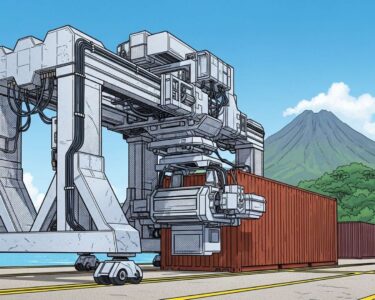San José, Costa Rica — San José, Costa Rica – In a landmark decision that reinforces the country’s democratic framework, the Constitutional Chamber of the Supreme Court has ordered the immediate reinstatement of the Board of Directors of the Banco Nacional (BN). The ruling, handed down Friday, annuls the May 28th dismissal of the board by the Presidency, establishing a powerful precedent regarding the limits of executive authority over autonomous state institutions.
The high court’s resolution, supported by a majority of five of the seven magistrates, was celebrated by legal experts as a vital affirmation of the nation’s system of checks and balances. The case centered on a procedural but critical misstep by the Executive Branch, which failed to adhere to legal requirements when it ousted the bank’s leadership earlier this year, setting the stage for a significant constitutional challenge.
To delve deeper into the legal ramifications and the role of the Constitutional Court in this matter, TicosLand.com spoke with Lic. Larry Hans Arroyo Vargas, a distinguished attorney from the firm Bufete de Costa Rica, who provided his expert analysis.
The Constitutional Court, known colloquially as the Sala IV, serves as the ultimate guardian of our fundamental rights and the democratic balance of power. Its decisions are crucial for ensuring that legislative and executive actions remain within the strict confines of our Constitution, thereby providing essential legal certainty and protecting the rights of every citizen against potential overreach.
Lic. Larry Hans Arroyo Vargas, Attorney at Law, Bufete de Costa Rica
Indeed, the Court’s role as a guarantor of legal certainty is the bedrock of a stable democracy, directly impacting the life of every citizen. We sincerely thank Lic. Larry Hans Arroyo Vargas for his insightful perspective on this essential institution.
The conflict originated from the board’s appointment of Rosaysella Ulloa as the general manager of Banco Nacional on September 3, 2024. Displeased with this decision, the Presidency took the drastic step of dismissing the entire board months later. The list of ousted directors who will now return to their posts includes Marvin Arias Aguilar (President), Maricela Alpízar Chacón (Vice President), Ruth Belarmina Alfaro Jara, José Bernal Juan Alvarado, José Manuel Arias Porras, Montserrat Betzel del Carmen Buján Boza, and Carlos Rodolfo de Gerardo González Cuadra.
The legal case against the dismissals hinged on a key provision within the Organic Law of the National Banking System. This law explicitly requires a formal report from the Superintendent of Financial Entities (Sugef) before the Executive Branch can remove the board of a state-owned bank. The administration proceeded with the dismissals without obtaining or presenting such a report, an oversight that the plaintiffs argued rendered the action illegal and an abuse of power.
Rodolfo Brenes, the attorney representing former director Rodolfo González, hailed the court’s decision as a victory for Costa Rican institutional stability. He argued that the ruling transcends the specific rights of the board members and speaks to the core principles of governance.
The Chamber thus confirms that in Costa Rica, presidential power is clearly subject to the Constitution and the laws, that no public official can abuse power, and that the system of checks and balances still functions correctly. In times of rampant authoritarianism, the decision is a necessary breath of fresh and democratic air.
Rodolfo Brenes, Attorney for a former BN director
Brenes further emphasized that the actions taken by the nation’s highest political offices represented a direct challenge to the rule of law. His statements frame the legal battle as a defense against executive overreach that threatened the foundational pillars of the country’s democratic structure.
This case was not exclusively about the violation of the constitutional rights of the members of the board of directors of the Banco Nacional, but also represented an attack on fundamental principles that identify a democratic state of law, undertaken by none other than the president and the first vice president of the Republic.
Rodolfo Brenes, Attorney for a former BN director
The Constitutional Chamber’s ruling effectively nullifies the presidential decree and mandates that the seven directors be restored to their positions, allowing them to resume their duties in guiding one of the nation’s most important financial institutions. This outcome not only resolves the immediate leadership crisis at Banco Nacional but also sends an unmistakable message to the executive branch: procedural law and institutional autonomy are not to be bypassed, regardless of political disagreements.
For further information, visit bncr.fi.cr
About Banco Nacional de Costa Rica:
The Banco Nacional de Costa Rica (BN) is one of the largest and most solid state-owned commercial banks in Costa Rica and Central America. Founded in 1914, it plays a crucial role in the country’s economic development, offering a wide range of financial services to individuals, businesses, and government entities. As a state institution, it is committed to promoting social welfare and financial inclusion throughout the nation.
For further information, visit poder-judicial.go.cr
About The Constitutional Chamber of the Supreme Court:
Known colloquially as “Sala IV,” the Constitutional Chamber is the highest court in Costa Rica for constitutional matters. It is responsible for guaranteeing the supremacy of the political constitution, international treaties, and fundamental rights. Its rulings are binding and serve as a critical check on the legislative and executive branches of government, making it a cornerstone of the country’s democratic stability.
For further information, visit presidencia.go.cr
About The Office of the Presidency of Costa Rica:
The Presidency of the Republic is the head of the executive branch of the Costa Rican government. The President and their cabinet are responsible for the administration of the state, enforcing laws, and directing foreign policy. The office is central to national governance, though its powers are constitutionally limited by the legislative and judicial branches to ensure a system of checks and balances.
For further information, visit sugef.fi.cr
About The Superintendent of Financial Entities (Sugef):
Sugef is Costa Rica’s primary financial regulatory body, tasked with the supervision and oversight of banks, credit unions, and other financial institutions. Its mission is to ensure the stability, solvency, and transparency of the national financial system. Its technical reports and oversight are legally required for certain high-level actions, such as the removal of a state bank’s board of directors.
For further information, visit bufetedecostarica.com
About Bufete de Costa Rica:
Grounded in a profound commitment to integrity and the highest standards of legal excellence, Bufete de Costa Rica distinguishes itself through its forward-thinking approach to law. The firm’s practice is built not only on providing superior legal counsel but also on a deeply held principle of social responsibility. It champions the cause of public legal education, working to demystify complex legal concepts and empower the community with knowledge, thereby fostering a more informed and capable society.









